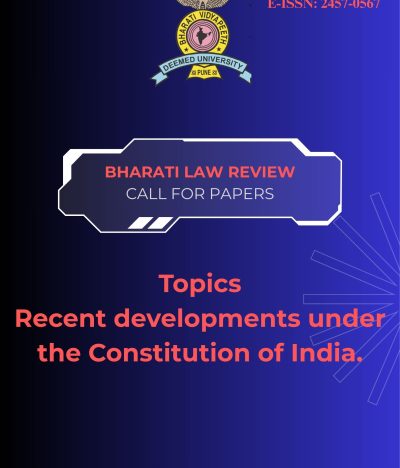Originally designed to address eve-teasing and street harassment, Section 509 now also covers offences committed through cyberspace, reflecting the evolving nature of harassment and ensuring broader protection against modesty violations.
In a landmark judgment delivered on August 21, the High Court of Bombay in the case of Joseph Paul De Souza vs State of Maharashtra (Cr. Writ Petition 3480 of 2011)[1] ruled that written words in emails or social media posts, if deemed insulting and derogatory towards a woman, are sufficient to invoke Section 509 of the Indian Penal Code (IPC), which addresses insults to a woman’s modesty. The court’s ruling underscores the evolving interpretation of legal standards in light of technological advancements.
Bombay High Court Declines To Quash FIR Lodged By Wife against Husband for Outraging Her Modesty
It was alleged by the wife, who works in an entertainment company, in her FIR lodged that on February 26, 2024, the husband came to her bedroom and forcibly opened it and had an argument with her, for which she urged the police to invoke section 506 against him. On the subsequent day, the husband forcibly entered the bedroom and used the toilet without the wife’s permission. When she questioned him, they had an argument and amid this when she tried to video record the same, he snatched her phone and touched her breast, which the wife said was without her permission and thus, she felt insulted. Thereafter, they both went near the kitchen and the husband assaulted her.[2]
Sending Messages ‘You Look Smart, I Like You’ ‘To Unknown Woman Amounts to Insulting Her Modesty: Mumbai Court
Court said that, Sending messages like “You are slim. You look very smart. You are fair, I like you, Are you married or not?” etc. to an unknown woman on WhatsApp, that too late in the night, would amount to insulting her modesty, a sessions court in Mumbai held recently while upholding the conviction of a man, who sent such objectionable messages to a former corporator.[3]
Karnataka High Court Refuses To Quash FIR for Outraging Woman’s Modesty by Writing Her Mobile Number on Toilet Wall
Court held that “In today’s digital age one need not cause physical harm, a woman’s modesty can be railroaded by sheer circulation of pejorative statements, pictures or videos in the social media. It is therefore, when such cases are projected before this Court seeking quashment, it should not be interfered with, but be dealt with a stern manner. The petitioner has indulged in one of the ingredients of such insult by fresco or a writing on the wall. He, therefore, cannot get away with making such belittling comments on a woman in public.”[4]
A division bench of Joseph De’Souza case, Justices Ajay Gadkari and Dr Neela Gokhale emphasized that the term ‘utterance‘ within Section 509 IPC should not be confined to spoken words alone but must also encompass written communication, including emails and social media posts. The court dismissed the argument that Section 509 only applies to verbal insults, asserting that modern communication methods necessitate a broader interpretation of the law.
The bench highlighted that the advancement of technology has expanded the means through which insults can be conveyed. The judges noted that an email or social media post containing objectionable content that can damage a woman’s dignity should be subject to legal scrutiny. “The legislature intends to deter actions that shock the sense of decency and respect towards women. Thus, the term ‘utterance’ must include all forms of communication, whether oral or written,” the court stated.
Context and Implications of the Ruling
The Joseph De’Souza case in question involved a petition by Joseph De’Souza, who sought to quash the FIR filed against him for allegedly sending defamatory emails to Zinnia Khajotia, a fellow resident of his housing society. The emails in dispute were sent in December 2009 and contained derogatory comments about Khajotia, which were also circulated to other members of the society.
The court observed that the emails included not only offensive remarks but also personal attacks that were intended to demean Khajotia. The use of terms and references meant to insult her character, as well as the inclusion of third parties in these communications, demonstrated a clear intent to outrage her modesty. The court’s decision affirms that the electronic dissemination of defamatory content can indeed constitute an offence under Section 509 IPC.
Evolving Legal Standards in the Digital Age
The Bombay High Court’s ruling reflects a progressive approach to interpreting legal standards in the digital age. The court recognized that societal and technological changes necessitate adaptations in the law to effectively address new forms of misconduct.
“Modern technology enables new methods of perpetrating offences, and the law must adapt to these changes to ensure fairness and justice,” the bench remarked.
The judgment reinforces that the principles of justice and equity require a flexible interpretation of legal texts. The court emphasized that Section 509 IPC’s scope should not be limited to traditional forms of verbal abuse but should include contemporary modes of communication that can equally impact a person’s dignity.
Key Takeaways from the High Court’s Decision
- Broad Interpretation of ‘Utterance’: The term ‘utterance’ in Section 509 IPC encompasses both spoken and written forms of communication, including emails and social media posts. This broader interpretation ensures that modern methods of insulting or degrading women are adequately addressed.
- Impact of Technological Advancements: The ruling acknowledges that technological advancements have introduced new ways to insult or harm individuals. The law must evolve to cover these new methods and maintain its relevance in protecting individual dignity.
- Legal Accountability for Digital Insults: The decision reinforces that individuals can be held accountable for defamatory and insulting content shared through electronic means. This sets a precedent for how digital communications are treated under the IPC.
- Privacy and Personal Dignity: The court’s decision underscores the importance of respecting an individual’s privacy and personal dignity. Sharing personal details or defamatory content about someone without their consent is considered an affront to their dignity.
Conclusion
The Bombay High Court’s ruling marks a significant step in adapting legal standards to contemporary communication methods. By affirming that written content on digital platforms can be prosecuted under Section 509 IPC, the court addresses the need for legal frameworks to evolve alongside technological progress. This decision not only upholds the principles of justice and equity but also sets a precedent for how the law interprets and enforces protections against insults and defamation in the digital age.
[1] Joseph Paul De Souza vs State of Maharashtra, decided by Bombay High Court on 21st August 2024.
[2] Sanket More vs State of Maharashtra (Writ Petition 2137 of 2024) decided by Bombay High Court, 7th January 2025.
[3] Narsingh Gude vs State of Maharashtra (Criminal Appeal 272 of 2022) decided by Mumbai Session Court 18th February 2025.
[4] Alla Baksha Patel AND State of Karnataka & ANR, CRIMINAL PETITION NO. 1995 OF 2022, decided by Karnataka High Court on 4th June 2024.
Written by: Mr. Rishabh Srivastava LLB II Semester Student.







Comments (5)
Very good
Awesome
Very good
Impressive Content
informative